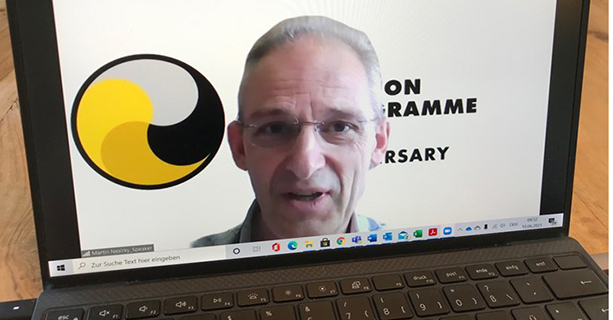
To mark the 20th anniversary of the Durban Declaration and Programme of Action, the United Nations Information Service (UNIS) Vienna organized two half-day workshops on 10 June 2021 for 55 teachers from Austria and Slovakia on how to tackle racism, intolerance and misinformation online and engage young people.
The online workshops were given by trainers from the Austrian NGO ZARA Training and organized by UNIS Vienna in cooperation with the University College of Teacher Education (KPH) Vienna/Krems and the State Pedagogical Institute (SPI) Slovakia.
The main topic of the workshops was “bystander intervention online” which begins, according to ZARA Training, with perception and a sense of responsibility and leads to taking action: “Bystander intervention means having the courage to stand up for someone who is being treated unjustly.”
In his welcoming remarks to both workshops, UNIS Director Martin Nesirky thanked the teachers for their strong interest; there were many more applicants than places. He said the topic was especially relevant as more time had been spent online during the pandemic. Nesirky said a great deal had been achieved through the Durban Declaration and Programme of Action but there was still much work to do.
During the interactive workshops - one held in English for teachers in Slovakia and one in German for teachers in Austria - the participating educators shared their experiences of online discrimination in their teaching environment and how they approach it. The workshop trainers provided valuable tips on how to identify untrustworthy sources as well as invasive and false claims on various social media channels. In one of the exercises, the participants were invited to rate the offensiveness of postings and explain why they perceived some allegations as moderate but others as insulting. During another group activity, they experienced that it is sometimes difficult to stay objective and not to be driven by emotions when confronted with very harsh and untrue statements that many young people experience.
The workshop trainers also presented possible strategies to fight hatred and misinformation online and how to report such activities. They explained that ZARA supports victims of discrimination and offers various services such as counselling for teachers, students and their families.
The workshops turned out to be an enriching experience for both trainers and participants. “It is interesting to see that the teachers in both countries talked about similar topics and challenges they face,” said one of the trainers at the end of the second workshop. Many teachers expressed their appreciation that workshops on these topics were offered to them and especially valued the practical advice and useful tips.
“It was wonderful. I learned a lot,” said one participant in Austria. “I am happy that I participated.”